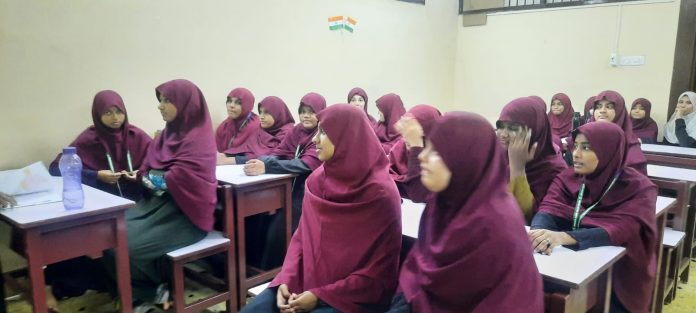– Rabia Basri
In the auditorium hall of Hidhaaya Islamic College for Girls – Chennai, where knowledge and inspiration harmoniously converge, students recently congregated for a day devoted to Seerah, the profound study of the life of Prophet Muhammad ﷺ. What unfolded was not merely a competition but a profound exploration of an age-old question that has ignited debates across generations: “Does a generation gap exist?” As two groups of students took their respective places, each representing opposing views, an intellectual discourse like no other began.
The group advocating against the existence of a generation gap was the first to take the floor. Their compelling arguments were deeply rooted in the rapid advancement of technology, painting a vivid picture of how innovation has fundamentally reshaped our world. They pointed to the monumental achievement of the moon landing as a compelling example of humanity’s remarkable capacity to reach unfathomable heights through technological progress. Their stance was unequivocal: the younger generation is not just different; they are indispensable contributors to an evolving society, adapting to new norms and seizing fresh opportunities.
In response, the opposing group offered a counterpoint that delved into an aspect often overshadowed in the relentless pursuit of progress: the importance of maintaining connections with those who are near and dear to us. While acknowledging the grandeur of reaching the moon, they cautioned against losing sight of the people who share our physical and emotional proximity. They implored us to remain vigilant against becoming so engrossed in the pursuit of worldly advancements that we inadvertently neglect our relationships and spiritual well-being. Their poignant query lingered in the air, echoing through the hallowed halls: “What is the value of reaching the moon if we lose touch with our earthly bonds and our connection with our Creator?”
The competition continued with the topic of modesty in dressing, where one side argued that the younger generation lacks modesty in their attire, citing sleeveless dresses and other immodest styles. The opposing side countered, emphasizing the importance of covering and maintaining modesty without revealing one’s hands.
The discussion shifted to the concept of joint families, with one group highlighting the challenges of in-law relationships, while the other argued that growing up in such an environment instils discipline and respect in children.
Additional topics, including transportation, the issue of disrespect towards elders, and the challenges posed by the misbehavior of young men, were also passionately debated. Each topic unveiled a similar schism in opinions, with one side lauding the virtues of modernization and the other side underscoring the importance of preserving timeless values and traditions.
The debates approached their conclusion, the mediator stepped into the spotlight, offering a perspective steeped in the teachings of Islam. With eloquence and conviction, she asserted that Islam, at its core, does not endorse the concept of a generation gap. To bolster her argument, she drew attention to the example of Prophet Ibrahim and his son Isma’il, whose collaborative construction of the Ka’bah symbolizes unity and devotion that transcend generations. Furthermore, she referenced the wisdom of Luqman, an ancient sage mentioned in the Quran, and his profound discussions with his son. These stories underscored the profound significance of passing down knowledge, values, and faith from one generation to the next.
Prophet Muhammad ﷺ taught us to bridge the gap through physical acts of intimacy and love. He recognized that the young often feel intimidated by the old, authoritative members of their family or community. Perpetuating fear and feelings of intimidation only widen the generation gap because the youth will never get close enough to the elders to be comfortable, to be at ease, and to learn.
The Seerah competition served as a poignant reminder that while technological progress and societal changes are inevitable, they should never become instruments that sever the sacred bonds between generations.
The timeless wisdom found in the Seerah of the Prophet Muhammad ﷺ offers invaluable guidance on how to bridge the apparent gaps, ensuring that each generation respects its roots, values its traditions, and carries forward the noble legacy laid by those who came before.
In a world characterized by relentless change and innovation, the lessons derived from these debates serve as a stirring reminder that the generation gap can indeed be bridged. By embracing the wisdom of the past while ardently striving for a brighter future, we can forge a path that is both technologically advanced and spiritually grounded – a harmonious blend of tradition and progress that propels us toward a shared destiny.
[The writer is Media In-charge of JIH – Women Wing]




